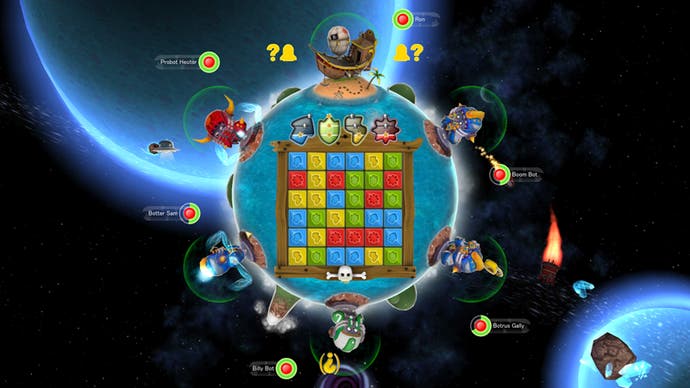Puzzlegeddon
In space, no-one can hear you matchmake.
There are three modes: the completely single-player Poison Peril and multiplayer options Deathmatch and Battle Royal. There's not a lot of fresh air between them. Deathmatch and Battle Royal are essentially the same, except that Deathmatch allows you to get back into the fray by completing a mini-puzzle challenge when your shield and health are exhausted, whilst Battle Royal is a last-thing-standing game with no comeback when you're dead and gone, which can mean some lengthy waits whilst a battle is concluded if you're knocked out early.
Deathmatch's mini-challenges are reprised in the Poison Peril mode. The brightly coloured squares which seem to be every puzzle game's inalienable birthright disappear and are replaced by a grid of skulls, coffins and other macabre knick-knacks, whilst the green and thriving planets become rotten balls of poisonous filth. The idea is to clear various targets within a certain number of 'transforms' - right clicks, basically - whilst avoiding the poison cubes which cross off an extra transform each time one is activated.
Challenges are a relatively straightforward business, although not always simple. Goals include certain numbers of chains to achieve, icon sets to completely clear and special combos to transform. Completing each challenge refreshes your transforms, apart from those lost to poison, and sets a new problem. Run out of transforms and it's game over and time to post your score on the leaderboard. Compelling enough, but not where we wager players will want to linger longest.
That would be in multiplayer, in Deathmatch and Battle Royal. The AI is an excellent partner for new players to pick up the basics with, gently paced at first and offering up to five concurrent opponents to hone your skills on. After that, it all gets a bit unfair. Stepping up to hard, and to a certain extent medium, AI enemies quickly reveals some of the slightly underhand mechanics at play.

Their resources are accumulated unbearably fast, resulting in an early barrage of missiles and debuffs which a mere human brain has no hope of retaliating against. AI opponents will also pull the classic 'ganging up' manoeuvre, launching staggered attacks at suspiciously well-timed intervals to ensure that at least a few make it through your beleaguered defences. I'm no master of the art, although progress felt swift and satisfying, but I defy anyone to topple five hard bots without resorting to some kind of Cthulhu-appeasement.
That's where I hit the major obstacle to enjoyment of an otherwise quite charming game. At various times over a few days, I didn't once find any other games in progress online. Not one. For a game that's been on the market for a few months worldwide now, it's a very discouraging sign. The other problems are excusable: the overly polarised AI difficulties, the somewhat haphazard nature of the resource collection (despite the tutorial's insistence that careful combo-planning yields the best results, that a luck-and-opportunity approach worked just as well), the inability to use only part of a resource gauge when a fully powered option is overkill.
These really are minor points. The core of Puzzlegeddon remains a fun, engaging take on a classic genre with a clever twist - but played against the soulless bots, with no bragging rights or trust in equanimity, there's a limited appeal which probably won't justify the admittedly low price-tag (GBP 10.95 at Direct2Drive). Find a similarly-minded friend, however, and feel free to adjust the score according to your love of competition.








